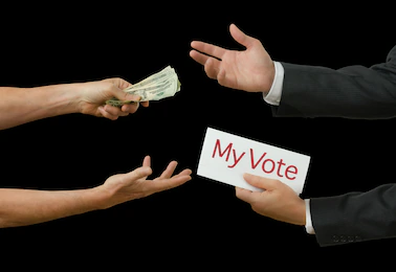 MOST of us hold strong opinions as to what we want from elected officials, but are they well informed and do we apply enough rigour in our judgement of politicians and how their policies actually deliver on the ideals we hold dear? As this disrupted election cycle closes out, we have seen a raft of promises, big dollar announcements from all sides. Millions and billions spent on this and that buying votes, but should we be so easily impressed? Shouldn’t we be measuring politicians on their results, not just how much money they spend?
Imagine a business where success was implied simply by the size of the expenses column? That’s not how it works. Businesses and even personal household budgets are after results — good value for money and a return on investment. Personally, I’m not really interested in what you are going to spend on health, only the outcomes in terms of operations, available medicines and level of care. I’m not impressed by the number of extra cops announced; I’d really like to know how much crime is going to be lowered. We are too easily bought off with our own money and coerced by being told what we want to hear. We don’t seem overly interested in doing the due diligence on whether spending will translate into something beneficial, or checking back if the policy announced actually delivered the results intended. You only need to look back three years to the promises made last election. A quick stock take by anyone other than the most ardent Labour lap dog will unearth a dearth of results. No light rail, no billion trees and even less progress on KiwiBuild, just to name a few of a plethora of unfulfilled election vote candy. Promise big, buy votes, deliver little and repeat. We can all be guilty of falling for headlines and well-manicured speeches from pulpits, treating words as if they are the results themselves, and basing our approval of policies on their intention, not their effectiveness. A recent example of this is the Prime Minister announcing if re-elected she intends to declare a climate emergency to go with the Zero Carbon Act. ‘‘Job done,’’ the fans say. Yet for all its good intentions, we need to see this for what it is — nothing but a virtue-laced, puddle-deep platitude that will achieve nothing. NZ accounts for less than 0.13% of global GHG emissions, and if we sunk into the ocean tomorrow it would make no difference to the rest of the world’s effort to combat rising emissions. However, where we do make a difference is via displacing emissions that would be created elsewhere through feeding 40 million people with high-quality, low-emissions protein. Yet the Prime Minister is asking Kiwis to eat less meat and the Greens are hammering rural NZ at every turn. But if we produce less food, production shifts to higher-emissions producers and we get poorer at the same time. Unfortunately, fanning the delusional hypocrisy is one of my favourite people, Sir David Attenborough, praising our Prime Minster for her climate change efforts. But if we do our due diligence and look under the hood at the results to date, our emissions have gone up under the current government’s watch. More interestingly, the often-vilified USA has lowered its emissions significantly over the last decade, and they are lower now than when climate change villain D.J. Trump took office. Who would have ever believed that? What happened is we cared more about what was said than what was done, what was promised than what was delivered and what was spent over what the results were. This election and all those that follow demand results — don’t just vote for promises. Comments are closed.
|
AuthorMark Wilson TAGS
All
Subscribe to updates below
|


 RSS Feed
RSS Feed